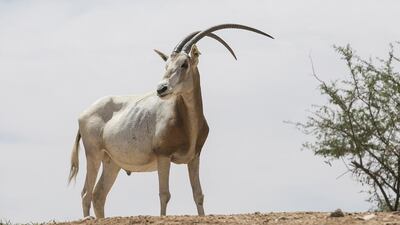For many adventure seekers going on a safari holiday is top of a wish list, but now you don’t have to travel all the way to the jungle because there’s one on your doorstep.
AL AIN // From Wednesday, nature and animal lovers will no longer have to travel thousands of kilometres to experience an African safari.
The world’s largest man-made safari park is opening its doors in Al Ain, giving visitors the chance to get up close and personal with more than 250 animals, all in a natural habitat.
The Al Ain Safari at Al Ain Zoo is part of an expansion project, which includes the Sheikh Zayed Desert Learning Centre, also now open.
The safari extends over 217 hectares – the size of 304 football pitches. Looking out the windows of the tour vehicle, seeing only wild animals among grass and sand, with mountains in the distance, it is easy to forget that this is in the heart of a modern city.
“Al Ain Safari has been masterfully crafted out of the desert environment to incorporate its pristine surrounds,” Al Ain Zoo director general Ghanim Al Hajeri said.
“The experience will be unique, being driven entirely by Emirati tour guides. This will emphasise local traditions and warm hospitality, drawing on an unrivalled passion for the UAE’s proud heritage.”
The safari is not just home to Arabian and African animals, such as the scimitar oryx, springbok, eland, blesbok, giraffe, zebra and lion, but also to 38 native and African plants.
To minimise any impact on the environment that plays home to this spectacular project, 2,500 plants and trees were moved during construction and then replanted after building work was completed.
Many more species will be introduced, including crocodiles and hippos, housed in an enclosure that makes it possible to view them both above and under the water, said Al Ain Zoo safari manager Luke Brown, from Zimbabwe.
While the safari and other attractions are being marketed on a small scale at the moment, the zoo has its sights on attracting many foreign tourists, with the construction of a large hotel overlooking the safari in the works.
Tickets for the safari experience cost Dh200 for a seat on a vehicle that allows great views of the animals. Alternatively, Nissan Patrol 4x4s, seating six passengers, can be rented for private trips at a cost of Dh1,000 per vehicle. A full circuit of the safari area will take between 45 minutes and an hour.
“These developments are just the beginning,” Mr Al Hajeri said. “Al Ain Zoo will position the city of Al Ain as a distinctive tourist destination, locally and regionally, upon the completion of the new developments. This will support Abu Dhabi’s vision towards a diverse economy not dependent on oil.”
Deciding whether to experience the desert learning centre or the safari first may be the hardest thing visitors will have to do.
Mr Al Hajeri described the learning centre as the jewel in the crown of the zoo’s expansion project.
The centre has five interactive galleries: Sheikh Zayed Tribute Hall, Abu Dhabi Desert Over Time, Abu Dhabi’s Living World, Looking to the Future and People of the Desert.
Described as the UAE’s first sustainable building, the centre is also the first to achieve a Five Pearl rating from Estidama and a Leadership in Energy & Environmental Design platinum certification.
A philosophy of sustainability and conservation guided the project from its beginning, with 92 per cent of construction waste either recycled, reused or reduced, said Mr Al Hajeri.
The 1.7 million kilograms of waste that was saved and not sent out into the environment is the equivalent of 24 fully loaded Airbus A320 airliners.
The centre’s special design resulted in a 70 per cent reduction in heat absorption from the Sun, and a 50 per cent saving in energy and water usage.
“The centre will teach visitors the importance of sustainability and preserving resources,” Mr Al Hajeri said.
For more information, visit alainzoo.ae.
newsdesk@thenational.ae

